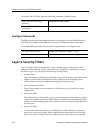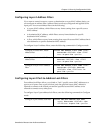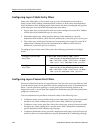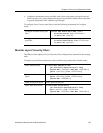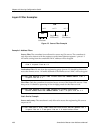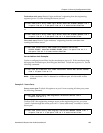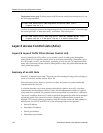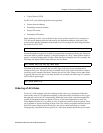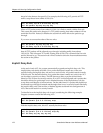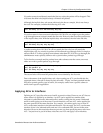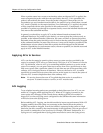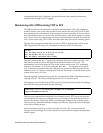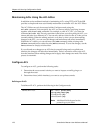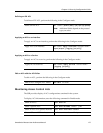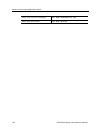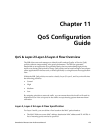
Chapter 10: Security Configuration Guide
172 SmartSwitch Router User Reference Manual
ahead of rules that are less specific. For example, the following ACL permits all TCP
traffic except those from subnet 10.2.0.0/16:
When a TCP packet comes from subnet 10.2.0.0/16, it finds a match with the first rule.
This causes the packet to be dropped. A TCP packet coming from other subnets will not
match the first rule. Instead, it matches the second rule which allows the packet to go
through.
If you were to reverse the order of the two rules:
then all TCP packets will be allowed to go through, including traffic from subnet
10.2.0.0/16. This is because TCP traffic coming from 10.2.0.0/16 will match the first rule
and be allowed to go. The second rule will not looked at since the first match determines
the action on the packet.
Implicit Deny Rule
At the end of each ACL, the system automatically appends an implicit deny rule. This
implicit deny rule denies all traffic. For a packet that doesn't match any of the user
specified rules, the implicit deny rule acts as a catch all rule. All packets match correctly
with this rule. The default behavior for a packet that doesn't match any rules in an ACL
can be either to permit or to deny. The SSR chooses to deny a packet as the default
behavior. This is done for security reasons. If an ACL is misconfigured and a packet that
should be allowed to go through is now blocked because of the implicit deny rule, the
worse that could happen is inconvenience. On the other hand, if a packet that should not
be allowed to go through is instead sent through, there is now a security breach. Basically,
the implicit deny rule is the last line of defense against accidental mis-configuration of
ACLs that could result in a security breach.
To describe how the implicit deny rule is used, considering the following example.
Suppose someone created the following ACL:
With the implicit deny rule, this ACL actually has three rules:
acl 101 deny tcp 10.2.0.0/16 any any any
acl 101 permit tcp any any any any
acl 101 permit tcp any any any any
acl 101 deny tcp 10.2.0.0/16 any any any
acl 101 permit ip 1.2.3.4/24
acl 101 permit ip 4.3.2.1/24 any nntp
acl 101 permit ip 1.2.3.4/24 any any any
acl 101 permit ip 4.3.2.1/24 any nntp any
acl 101 deny any any any any any



